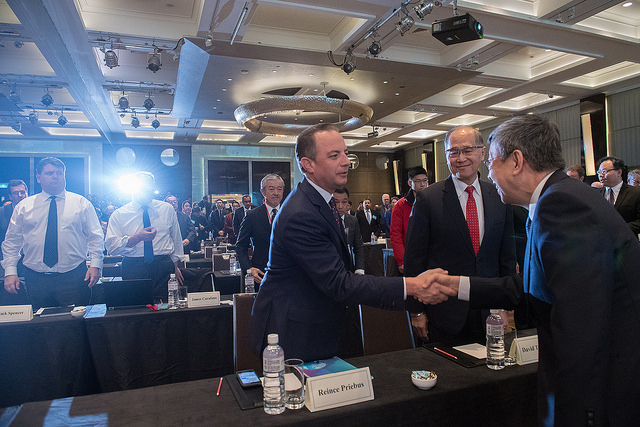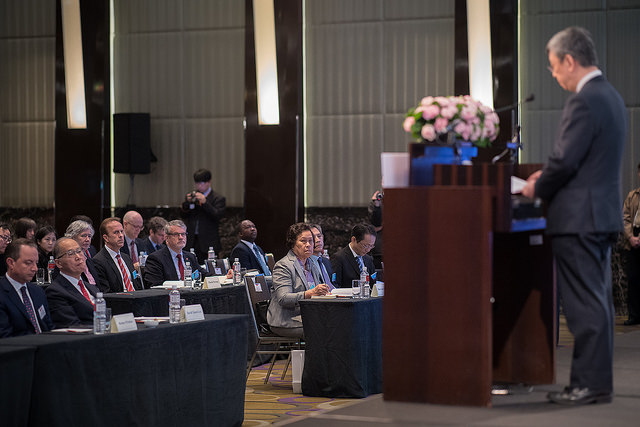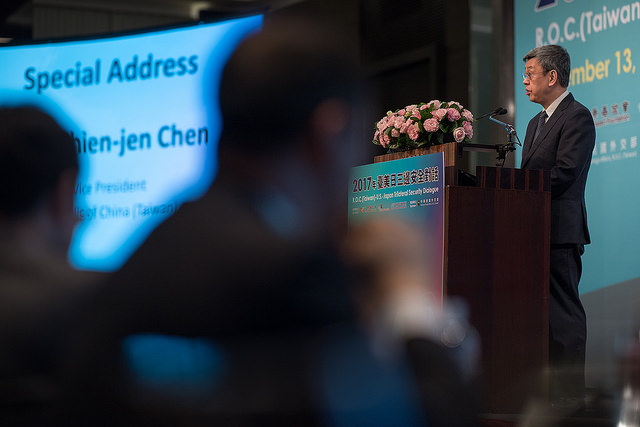News & activities
 News releases
News releases
On the morning of December 13, Vice President Chen Chien-jen attended the 2017 Taiwan-US-Japan Trilateral Security Dialogue. He spoke about what Taiwan is doing to increase regional trade and security, and Taiwan's hopes to work with the United States and Japan to combine our respective strengths, and enhance regional security to protect regional prosperity.
The following is a transcription of Vice President Chen's remarks:
Good morning!
On behalf of President Tsai Ing-wen and the people of Taiwan, welcome to today's trilateral security dialogue.
To start off, I want to thank our cohosts: the Prospect Foundation of Taiwan, the Heritage Foundation of the United States, and the Sasakawa Peace Foundation of Japan.
I also want to remind everyone that our dialogue is founded on shared values. Democracy, freedom, and the rule of law bind us all together to defend our interests, and promote stability.
Much of what I have to say today is based on the relationship between national security and national prosperity.
History tells us that without national security, there is no national prosperity. So as a strategic link in the first island chain, and with a vibrant economy that depends on trade, Taiwan has much at stake. We all do.
As Foreign Minister David Lee (李大維) just said, we've been encouraged by breakthroughs in Taiwan-US and Taiwan-Japan relations this year. So our values-based friendships are strong, and we remain trilateral partners with common goals.
But obstacles remain. North Korea continues to make progress on its missile program. China continues to pressure Taiwan on all fronts, and make maritime claims that violate international law.
So at the recent APEC Leaders' Summit in Vietnam, we were happy to see President Trump announce his vision for a free and open Indo-Pacific region.
And under Japan's leadership, 11 nations have signed the Comprehensive and Progressive Agreement for the TPP.
Taiwan supports these initiatives, and we look forward to working with the United States and Japan to see them through.
Our government policies over the past 18 months show that we are firm advocates of increased regional and international cooperation, and free trade.
One way we're working to increase cooperation and trade, and strengthen ties in the Indo-Pacific region, is by redefining Taiwan's regional role through our New Southbound Policy.
The New Southbound Policy is a comprehensive initiative focused on the long-term development needs of South and Southeast Asian countries, especially in terms of talent cultivation and trade complementarity.
By providing training and know-how, Taiwan can play a more proactive regional role.
Our region still has a lot of developmental potential. And one way to tap that potential is to combine Taiwan's high-tech and manufacturing supply chains with Japan's R&D and branding capabilities.
Taiwan and the US can also benefit from that same cooperation model.
At the same time, we're also pursuing bilateral investment and trade agreements, and opportunities to participate in multilateral trade mechanisms.
It's clear that multilateral trade agreements support geopolitical alliances, and a rules-based trading framework can help support a rules-based security framework.
So we're very excited to see that the Comprehensive and Progressive Agreement for the TPP has some momentum, and we hope to be part of it soon.
Here at home, we're also re-inventing Taiwan's industrial structure, and have launched a massive forward-looking infrastructure plan. We're focusing on five major innovative industries, and have embraced the digital future.
That future will include a healthy dose of renewable energy to keep our nation safe, and keep the wheels of industry turning.
So in terms of economics, Taiwan is working to create co-prosperity by restructuring at home, and reaching out to our regional neighbors in a spirit of cooperation for mutual benefits.
But even as we're working to create prosperity, we're equally concerned about security.
Taiwan remains ready, willing, and able to help maintain regional order. We're working with our partners to respond to threats from North Korea. So we've implemented UN Security Council resolutions and sanctions, and investigated possible money laundering and suspect shipping activities.
The South China Sea is another potential flashpoint for regional conflicts with international repercussions.
China continues to ignore a ruling by the Permanent Court of Arbitration in its dispute with the Philippines. In contrast, Taiwan is using Taiping Island, the largest natural island in the South China Sea, as a station for scientific research and humanitarian purposes.
So we'll continue to monitor the situation, and safeguard freedom of navigation and overflight to ensure a free and open South China Sea. That's essential for regional security, and a sustainable global economy.
In addition to its provocative behavior in the South China Sea, China has also been sending more and more naval vessels and aircraft through the East China Sea.
Nevertheless, we remain committed to maintaining the status quo of peace and stability in the Taiwan Strait. But that requires cooperation from both sides.
We’re looking for positive dialogue between the two sides of the Taiwan Strait. And we hope it happens soon.
That would benefit the people on both sides, our region, and our world.
So today I'm glad to see so many lawmakers, scholars, and experts from Taiwan, the United States, and Japan looking for innovative ways to combine our respective strengths, and enhance regional security to protect regional prosperity.
I trust our dialogue will be thought-provoking and rewarding, and wish one and all health, happiness, and a joyous holiday season.
Thank you very much!











